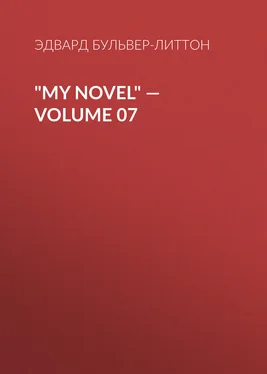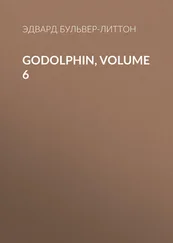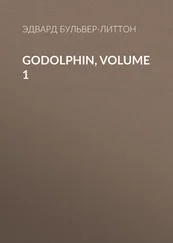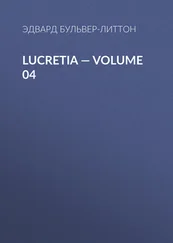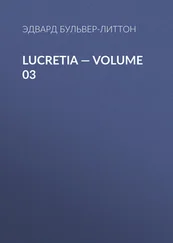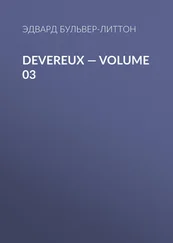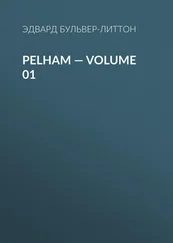Эдвард Бульвер-Литтон - My Novel — Volume 07
Здесь есть возможность читать онлайн «Эдвард Бульвер-Литтон - My Novel — Volume 07» — ознакомительный отрывок электронной книги совершенно бесплатно, а после прочтения отрывка купить полную версию. В некоторых случаях можно слушать аудио, скачать через торрент в формате fb2 и присутствует краткое содержание. Жанр: foreign_prose, literature_19, Европейская старинная литература, foreign_antique, на английском языке. Описание произведения, (предисловие) а так же отзывы посетителей доступны на портале библиотеки ЛибКат.
- Название:My Novel — Volume 07
- Автор:
- Жанр:
- Год:неизвестен
- ISBN:нет данных
- Рейтинг книги:3 / 5. Голосов: 1
-
Избранное:Добавить в избранное
- Отзывы:
-
Ваша оценка:
- 60
- 1
- 2
- 3
- 4
- 5
My Novel — Volume 07: краткое содержание, описание и аннотация
Предлагаем к чтению аннотацию, описание, краткое содержание или предисловие (зависит от того, что написал сам автор книги «My Novel — Volume 07»). Если вы не нашли необходимую информацию о книге — напишите в комментариях, мы постараемся отыскать её.
My Novel — Volume 07 — читать онлайн ознакомительный отрывок
Ниже представлен текст книги, разбитый по страницам. Система сохранения места последней прочитанной страницы, позволяет с удобством читать онлайн бесплатно книгу «My Novel — Volume 07», без необходимости каждый раз заново искать на чём Вы остановились. Поставьте закладку, и сможете в любой момент перейти на страницу, на которой закончили чтение.
Интервал:
Закладка:
Strange and dread philosophy, that made it a maxim to squander the gifts of mind on the mere care for matter, and fit the soul to live but as from day to day, with its scornful cry, "A fig for immortality and laurels!" An author for bread! Oh, miserable calling! was there something grand and holy, after all, even in Chatterton's despair?
CHAPTER VI
The villanous "Beehive"! Bread was worked out of it, certainly; but fame, but hope for the future,—certainly not. Milton's Paradise Lost would have perished without a sound had it appeared in the "Beehive."
Fine things were there in a fragmentary crude state, composed by Burley himself. At the end of a week they were dead and forgotten,—never read by one man of education and taste; taken simultaneously and indifferently with shallow politics and wretched essays, yet selling, perhaps, twenty or thirty thousand copies,—an immense sale; and nothing got out of them but bread and brandy!
"What more would you have?" cried John Burley. "Did not stern old Sam Johnson say he could never write but from want?"
"He might say it," answered Leonard; "but he never meant posterity to believe him. And he would have died of want, I suspect, rather than have written 'Rasselas' for the 'Beehive'! Want is a grand thing," continued the boy, thoughtfully,—"a parent of grand things. Necessity is strong, and should give us its own strength; but Want should shatter asunder, with its very writhings, the walls of our prison-house, and not sit contented with the allowance the jail gives us in exchange for our work."
"There is no prison-house to a man who calls upon Bacchus; stay, I will translate to you Schiller's Dithyramb. 'Then see I Bacchus; then up come Cupid and Phcebus, and all the Celestials are filling my dwelling.'"
Breaking into impromptu careless rhymes, Burley threw off a rude but spirited translation of that divine lyric. "O materialist!" cried the boy, with his bright eyes suffused. "Schiller calls on the gods to take him to their heaven with them; and you would debase the gods to a ginpalace."
"Ho, ho!" cried Burley, with his giant laugh. "Drink, and you will understand the Dithyramb."
CHAPTER VII
Suddenly one morning, as Leonard sat with Burley, a fashionable cabriolet, with a very handsome horse, stopped at the door. A loud knock, a quick step on the stairs, and Randal Leslie entered. Leonard recognized him, and started. Randal glanced at him in surprise, and then, with a tact that showed he had already learned to profit by London life, after shaking hands with Burley, approached, and said, with some successful attempt at ease, "Unless I am not mistaken, sir, we have met before. If you remember me, I hope all boyish quarrels are forgotten?"
Leonard bowed, and his heart was still good enough to be softened.
"Where could you two ever have met?" asked Burley. "In a village green, and in single combat," answered Randal, smiling; and he told the story of the Battle of the Stocks, with a well-bred jest on himself. Burley laughed at the story. "But," said he, when this laugh was over, "my young friend had better have remained guardian of the village stocks than come to London in search of such fortune as lies at the bottom of an inkhorn."
"Ah," said Randal, with the secret contempt which men elaborately cultivated are apt to feel for those who seek to educate themselves,— "ah, you make literature your calling, sir? At what school did you conceive a taste for letters? Not very common at our great public schools."
"I am at school now for the first time," answered Leonard, dryly.
"Experience is the best schoolmistress," said Burley; "and that was the maxim of Goethe, who had book-learning enough, in all conscience."
Randal slightly shrugged his shoulders, and without wasting another thought on Leonard, peasant-born and self-taught, took his seat, and began to talk to Burley upon a political question, which made then the war-cry between the two great parliamentary parties. It was a subject in which Burley showed much general knowledge; and Randal, seeming to differ from him, drew forth alike his information and his argumentative powers. The conversation lasted more than an hour.
"I can't quite agree with you," said Randal, taking his leave; "but you must allow me to call again,—will the same hour tomorrow suit you?"
"Yes," said Burley.
Away went the young man in his cabriolet. Leonard watched him from the window.
For five days, consecutively, did Randal call and discuss the question in all its bearings; and Burley, after the second day, got interested in the matter, looked up his authorities, refreshed his memory, and even spent an hour or two in the Library of the British Museum.
By the fifth day, Burley had really exhausted all that could well be said on his side of the question.
Leonard, during these colloquies, had sat apart seemingly absorbed in reading, and secretly stung by Randal's disregard of his presence. For indeed that young man, in his superb self-esteem, and in the absorption of his ambitious projects, scarce felt even curiosity as to Leonard's rise above his earlier station, and looked on him as a mere journeyman of Burley's.
But the self-taught are keen and quick observers; and Leonard had remarked that Randal seemed more as one playing a part for some private purpose, than arguing in earnest; and that, when he rose, and said, "Mr. Burley, you have convinced me," it was not with the modesty of a sincere reasoner, but the triumph of one who has gained his end. But so struck, meanwhile, was our unheeded and silent listener with Burley's power of generalization and the wide surface over which his information extended, that when Randal left the room the boy looked at the slovenly, purposeless man, and said aloud, "True; knowledge is not power."
"Certainly not," said Burley, dryly,—"the weakest thing in the world."
"Knowledge is power," muttered Randal Leslie, as, with a smile on his lip, he drove from the door.
Not many days after this last interview there appeared a short pamphlet; anonymous, but one which made a great impression on the town. It was on the subject discussed between Randal and Burley. It was quoted at great length in the newspapers. And Burley started to his feet one morning, and exclaimed, "My own thoughts! my very words! Who the devil is this pamphleteer?"
Leonard took the newspaper from Burley's hand. The most flattering encomiums preceded the extracts, and the extracts were as stereotypes of Burley's talk.
"Can you doubt the author?" cried Leonard, in deep disgust and ingenuous scorn. "The young man who came to steal your brains, and turn your knowledge—"
"Into power," interrupted Burley, with a laugh,—but it was a laugh of pain. "Well, this was very mean; I shall tell him so when he comes."
"He will come no more," said Leonard. Nor did Randal come again. But he sent Mr. Burley a copy of the pamphlet with a polite note, saying, with candid but careless acknowledgment, that he "had profited much by Mr. Burley's hints and remarks."
And now it was in all the papers that the pamphlet which had made so great a noise was by a very young man, Mr. Audley Egerton's relation. And high hopes were expressed of the future career of Mr. Randal Leslie.
Burley still attempted to laugh, and still his pain was visible. Leonard most cordially despised and hated Randal Leslie, and his heart moved to Burley with noble but perilous compassion. In his desire to soothe and comfort the man whom he deemed cheated out of fame, he forgot the caution he had hitherto imposed on himself, and yielded more and more to the charm of that wasted intellect. He accompanied Burley now to the haunts to which his friend went to spend his evenings; and more and more—though gradually, and with many a recoil and self-rebuke—there crept over him the cynic's contempt for glory, and miserable philosophy of debased content.
Читать дальшеИнтервал:
Закладка:
Похожие книги на «My Novel — Volume 07»
Представляем Вашему вниманию похожие книги на «My Novel — Volume 07» списком для выбора. Мы отобрали схожую по названию и смыслу литературу в надежде предоставить читателям больше вариантов отыскать новые, интересные, ещё непрочитанные произведения.
Обсуждение, отзывы о книге «My Novel — Volume 07» и просто собственные мнения читателей. Оставьте ваши комментарии, напишите, что Вы думаете о произведении, его смысле или главных героях. Укажите что конкретно понравилось, а что нет, и почему Вы так считаете.
